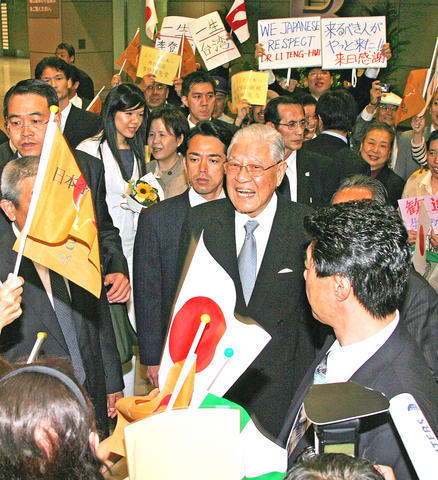Former president Lee Teng-hui (
Lee's elder brother served in the Japanese navy and died while on duty in February 1945 in the Philippines.
"I have not yet decided on the timing, but since I am here, I think that I should go see my brother," Lee told reporters on his arrival at Narita airport near Tokyo.

PHOTO: AFP
"I will meet my brother for the first time in 60 years," Lee said.
Lee, accompanied by his wife Tseng Wen-hui (
Speaking to Japanese reporters on the flight from Taipei, the 84-year-old former leader said he wanted to pray at the Yasukuni shrine because he did not know how much longer he would live.
The Yasukuni shrine honors 2.5 million war dead, including colonial subjects who fought for Japan. Visits to the shrine by Japanese leaders have long been a subject of dispute with China and South Korea which view the shrine as a symbol of Japan's militarist past. Most controversially, the Shinto shrine lists the names of 14 top war criminals from World War II.
Based on the itinerary released by Lee's office, the former president will spend the first three days visiting Tokyo, culminating in a ceremony wherein he will be presented with the first Shinpei Goto Prize by Tokyo's Shinpei Goto Society tomorrow.
The prize was established to mark the 150th anniversary of the birth of the late Japanese colonial administrator Shinpei Goto and is awarded to people who have contributed to national or regional development.
From Saturday to Tuesday, Lee will make an "oku no hosomichi" tour covering the prefectures of Miyagi, Yamagata, Iwate, Akita and Gunma, retracing a journey made by the Japanese poet Basho in 1689 on which his famous work Oku no Hosomichi, or The Narrow Road to Oku was written.
Lee is scheduled to visit Akita International University next Wednesday, where he will give a speech on Japanese education and hold a seminar with Taiwanese students. He will also visit Takushoku University in Tokyo to discuss the global outlook this year. He will wrap up his visit next Saturday.

The Grand Hotel Taipei on Saturday confirmed that its information system had been illegally accessed and expressed its deepest apologies for the concern it has caused its customers, adding that the issue is being investigated by the Ministry of Justice Investigation Bureau. The hotel said that on Tuesday last week, it had discovered an external illegal intrusion into its information system. An initial digital forensic investigation confirmed that parts of the system had been accessed, it said, adding that the possibility that some customer data were stolen and leaked could not be ruled out. The actual scope and content of the affected data

DO THEY BITE IT? Cats have better memories than people might think, but their motivation is based entirely around the chance of getting fed Cats can remember the identity of the people who fed them the day before, Taipei-based veterinarians said on Friday, debunking a popular myth that cats have a short memory. If a stray does not recognize the person who fed them the previous day, it is likely because they are not carrying food and the cat has no reason to recognize them, said Wu Chou Animal Hospital head Chen Chen-huan (陳震寰). “When cats come to a human bearing food, it is coming for the food, not the person,” he said. “The food is the key.” Since the cat’s attention is on the food, it

‘LIKE-MINDED PARTNER’: Tako van Popta said it would be inappropriate to delay signing the deal with Taiwan because of China, adding he would promote the issue Canadian senators have stressed Taiwan’s importance for international trade and expressed enthusiasm for ensuring the Taiwan-Canada trade cooperation framework agreement is implemented this year. Representative to Canada Harry Tseng (曾厚仁) in an interview with the Central News Agency (CNA) said he was increasingly uneasy about Ottawa’s delays in signing the agreement, especially as Ottawa has warmed toward Beijing. There are “no negotiations left. Not only [is it] initialed, we have three versions of the text ready: English, French and Mandarin,” Tseng said. “That tells you how close we are to the final signature.” Tseng said that he hoped Canadian Prime Minister Mark Carney

President William Lai (賴清德) yesterday bestowed one of Taiwan’s highest honors on Saint Vincent and the Grenadines (SVG) Ambassador Andrea Clare Bowman in recognition of her contributions to bilateral ties. “By conferring the Order of Brilliant Star with Grand Cordon on Ambassador Bowman today, I want to sincerely thank her, on behalf of the Taiwanese people, for her outstanding contribution to deepening diplomatic ties between Taiwan and SVG,” Lai said at a ceremony held at the Presidential Office in Taipei. He noted that Bowman became SVG’s first ambassador to Taiwan in 2019 and